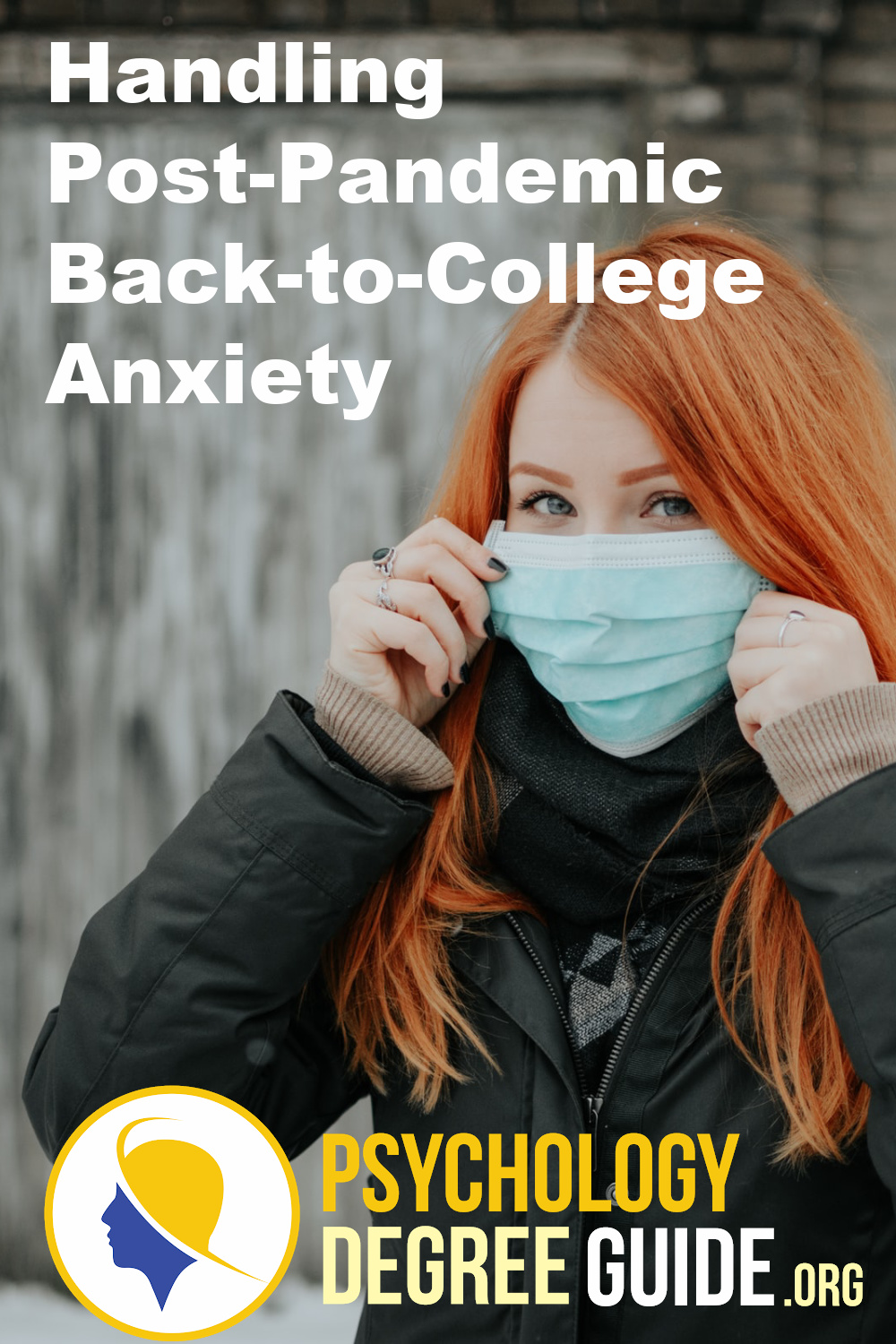A Student’s Guide to Handling Post-Pandemic Back-to-College Anxiety
- July 7, 2021
- Posted by: Administrator
- Category: Student Resources,
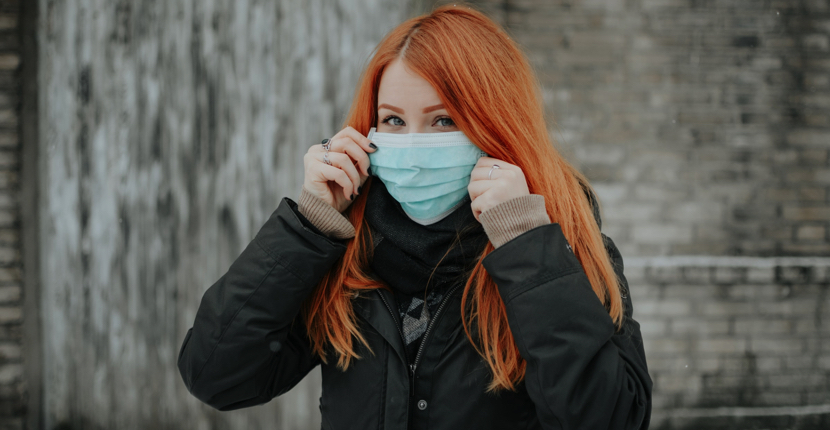
Most of us would agree that the past 18 months have been among the strangest we’ve ever experienced. The COVID-19 pandemic dashed the hopes of college students everywhere, excited for a taste of independence and new friends. Spring 2020 sent college students across the U.S. fleeing from campuses, and in many cases, spending the rest of the year attending classes virtually from their childhood bedrooms.
Sponsored School(s)
When conditions improved during the summer of 2020, many colleges decided to bring students back to campus for the 2020-2021 academic year. For some campuses, this meant super-spreader events and a new source of community transmission. For others, it meant strict social distancing protocols, health screenings, and zero tolerance policies for unsanctioned social gatherings.
As one would assume, some colleges and universities were more successful than others when it came to limiting the spread of the virus. But either way, the 2020-2021 academic year was taxing for students and parents alike.
The virus has begun to recede in the United States, thanks to the highly effective vaccines that were rolled out in the winter and spring of 2021. As we resume many of our normal activities and spend time with loved ones this summer, many students entering or returning to college in the fall—and their parents—will experience anxiety about post-pandemic life. Here are some tips for managing anxiety over your return to campus.
Manage Your Expectations
If you have been anticipating a full return to life as it was before the pandemic began, it will be important to adjust your expectations a bit. While you can almost certainly expect more social interaction, more in-person learning, and more freedom than you were allowed last year, some restrictions will remain.
While some universities will adopt a hybrid model, leaving open the possibility for students to attend classes virtually, a good number will require a full return to campus, assuming it can still be done safely come fall. Many universities generate a large portion of their revenue from their on-campus operations, like dining halls and dormitories. For better or for worse, these universities would be facing financial crises without students on campus.
It is likely that more conservative social distancing protocols, masking requirements, and testing and tracing infrastructure will continue to be part of college life in the coming year or two, even as local communities loosen restrictions. Many universities have also announced that they will require students, faculty, and staff to be vaccinated in order to return to campus. Some colleges will make vaccines mandatory only when the Pfizer and Moderna vaccines are granted full FDA approval, but this may not happen until the end of the calendar year.
Try to shift your mindset to accept the reality that life won’t be exactly the same as it was before the pandemic for a while. The restrictions will be there either way.
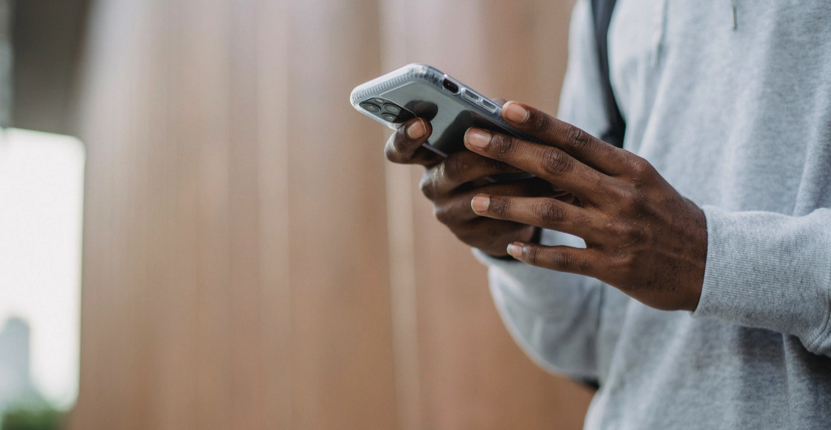
Get Organized
Next, some pragmatic advice.
Since the start of the Coronavirus pandemic in early 2020, we have been subject to almost constantly changing rules and regulations from federal, state, and local authorities, our workplaces, our schools, and even our families and roommates.
With many colleges adopting zero-tolerance policies when it comes to pandemic-related policies, you might feel overwhelmed by the requirements imposed by your campus administration.
To minimize day-to-day anxiety, try to stay organized.
- Create reminders: There may be recurring tasks for you to complete when you’re back on campus, like regular COVID-19 testing, or daily health screenings. Create reminders and calendar notifications to alert you when it’s time to schedule a test or fill out your health survey. “Set it and forget it” is the rule of thumb here.
- Dedicate a place for everything: “Keys, wallet, phone…mask, extra mask, hand sanitizer…” Running around looking for all the essential items we need when we’re late for class can be anxiety-provoking. Identify a space on the countertop or a basket by the door to drop the ever-growing laundry list of important personal items, so you can easily grab-and-go, even when you’re in a rush.
- Plan for unanticipated change: When Coronavirus was declared a pandemic in March 2020, we had to move fast. College students who needed to return home scrambled to buy up flights and plane tickets at rising prices and struggled to transport their personal items back home amidst all the unknowns of a new virus. While the level of chaos we endured in March 2020 is unlikely to happen in the near future, new variants of the Coronavirus threaten to dodge vaccines and disrupt our way of life yet again. Mentally prepare for the possibility that things will change. If you can, create an emergency fund in the event you need to purchase a flight home. Make a plan with parents and loved ones about what to do if cases rise again. Rest easy that a repeat of March 2020 is unlikely, but having a plan in place is likely to alleviate some anxiety about the unknown.
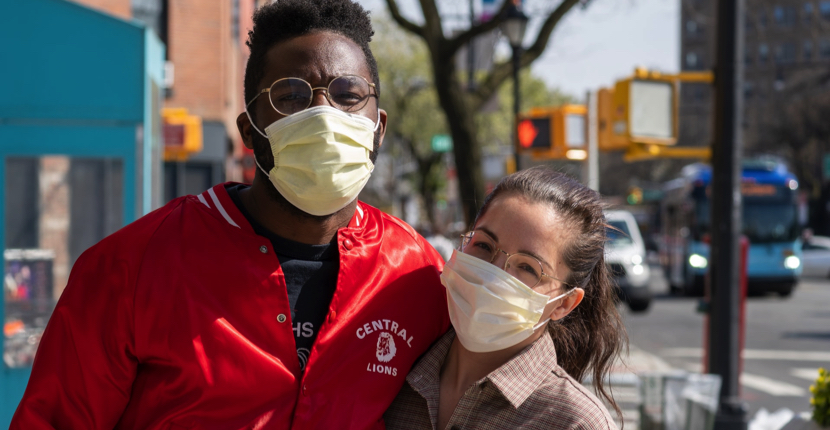
Know your Limits
For a year and a half, we were unable to spend time in person with friends and loved ones. As a college student, one of the most exciting things about campus life is the potential for new friends, dating, parties, and school clubs.
As a more widely vaccinated population has allowed us to resume most social interaction, it might feel strange to be surrounded by other people again. For some, the return to an active social life can feel overwhelming and unfamiliar.
If increased socializing starts to feel like too much, take a break. FOMO (fear of missing out) is real, but try to remind yourself that there will be more parties, more outings, more time spent with friends.
Another issue you may be concerned about is the changing norms around masking and social distancing. Guidance from public health organizations like the CDC and WHO is often inconsistent, with varying recommendations regarding masks for fully vaccinated people and the acceptable size of social gatherings. The only person who can decide what’s right for you is you. Taking your vaccination status and personal risk factors into account, think about what you’re comfortable with. For example, you might decide you’re comfortable spending time in groups of fully vaccinated folks without a mask, but that you’ll remain masked if the vaccination status of a group is unknown.
The bottom line is that you should develop an awareness of what makes you feel comfortable, and what makes you feel anxious when it comes to the virus. A sense of safety is the most important factor that can influence how anxious you are.
Embrace the Awkward
But yes, sometimes asserting and enforcing your boundaries will feel awkward. Our social norms have been turned on their head, and just about everyone is feeling awkward about navigating them.
Having conversations about things like vaccination status and masking isn’t easy, but it’s necessary. There will certainly be times when you’ll encounter tension, but there are a few ways to make sure things don’t get too stressful.
First, be clear and direct with your requests. If you’re wondering if someone is vaccinated, ask them. If you’re aware that someone is not vaccinated and would like them to wear a mask in your presence, let them know. You will generate more anxiety by wondering whether you’re in a safe environment than by asking for what you need. Try something like this:
“I’m still being pretty cautious about the virus because I live with my grandmother who is immunocompromised. Would you mind wearing a mask if you haven’t been vaccinated?”
Or, “Would you mind sharing your vaccination status? I’m not comfortable hanging out unmasked with unvaccinated folks.”
Second, keep it light. It’s okay to laugh about this totally unexpected state of affairs. We’re all experiencing this strange shift in social norms together. Acknowledging the awkwardness—and the absurdity—of our changing world can help break the tension. Try this:
“Unfortunately, I’m going to have to start asking intrusive questions before we even have our first date! Have you had the vaccine yet? I have, and I’m only comfortable seeing someone who is also protected.”
Not everyone is going to respond positively to your efforts to make sure your environment is safe. While these situations can be anxiety-inducing, they will become less difficult with practice. Plus, it might be a good shortcut to knowing who will be a good friend or partner in the future.
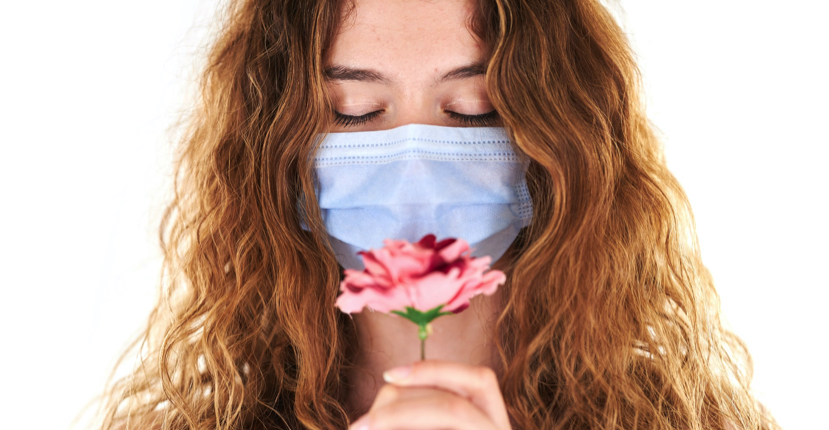
Appreciate the Small Things
Uncertainty is a real driver of anxiety, and the COVID-19 pandemic has certainly generated more than its fair share of unknowns. Spending time trying to anticipate what the next week, month, or year will be like is a surefire way to generate anxiety. So can reflecting on the past with regret.
Mindfulness practices are known to be highly effective for relieving anxiety. Like anything, mindfulness takes practice, but slowing down to appreciate the small things is a great way to start.
In the coming months, you will likely experience many “firsts” since the start of the pandemic. The simple pleasures of gathering with friends at a restaurant, attending an outdoor concert, attending class…in a real classroom…will begin to return. If you’ve been missing the experience of spending time in communion with others, take a moment to acknowledge with gratitude the first meal with a friend, the first dance party in your dorm, and the first unmasked group project meeting of the school year.
Acknowledging and appreciating the small things is a way to bring your attention to the present moment and prevent your mind from spiraling into anxious thoughts.
Recognize the Signs of Worsening Anxiety
While everyone is bound to experience some anxiety around “reopening” and returning to college, for some, it will begin to interfere with daily life in ways that may require the help of a therapist.
If you begin to experience any of the following symptoms, it might be time to talk to a mental health professional. Most colleges have a counseling center where students can see a therapist for a limited number of sessions free of charge.
- Panic attacks
- Difficulty eating or overeating
- Significant weight loss or weight gain
- Frequent difficulty breathing or shortness of breath
- Difficulty sleeping, excessive sleeping, or extreme fatigue
- Unusual irritability, difficulty concentrating, or being easily startled
- Obsessive or intrusive thoughts, and/or repetitive compulsive behaviors (i.e. hand washing or checking locks)
- Avoiding social situations beyond what is required to prevent transmission of the virus
Sometimes, just talking to someone about how you’re feeling can help relieve symptoms of worsening anxiety. Other times, medication is needed to get symptoms under control. Either way, it’s important to address symptoms of anxiety if they begin to interfere with your ability to carry out your daily responsibilities and activities.
Resources
For more information on the topics discussed in this article, please see the resources below.
- Cdc.gov and who.int offer up-to-date information on vaccinations, COVID-19 variants of concern, and masking recommendations.
- For trends on college re-openings and vaccination requirements on college campuses, visit the Chronicle Of Higher Education website and insidehighered.com (please note that you can read five articles without a subscription).
- The Mayo Clinic offers a wealth of information on anxiety disorders, as does our article on Mental Health Resources for College Students.
- For more information on finding a therapist, visit psychologytoday.com and this article from WebMD.
- For more information on Mindfulness practices, check out mindful.org.
